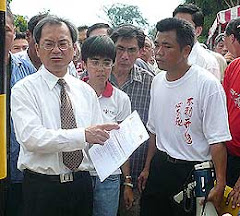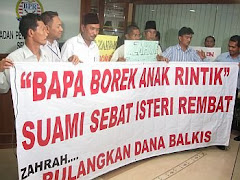WITH the launch of the Kuala Lumpur wireless metropolitan project at the City Hall headquarters yesterday, the entire capital city will be covered by a wireless broadband access network in the near future.
 This means that if you are in KL, you will not need to patronise certain cafes or pay for Internet services to go wireless.
This means that if you are in KL, you will not need to patronise certain cafes or pay for Internet services to go wireless.Everyone in the city will be able to use the service, which runs at 512kb per second, for free over the next two years.
The service is based on WiMAX 2.3 Giga Hertz. Kuala Lumpur is among one of the first cities in the world to use this technology.
The project was jointly launched by Federal Territories Minister Datuk Seri Zulhasnan Rafique and KL Mayor Datuk Ab Hakim Borhan.
The city-wide project involves the Kuala Lumpur City Hall (DBKL), Malaysian Communication and Multimedia Commission (MCMC), Synapse Technologies Sdn Bhd and Packet One Networks (M) Sdn Bhd.
It involves two parts. The first is to make the city wireless with the collaboration of Packet One Networks while the second part is to have the city's own portal www.kul.com.my managed by Synapse Technologies.
The first phase of the project will see 1,500 Wi-Fi zones installed by end of this year at the commercial areas, offices, DBKL public housings and PPR flats, DBKL community centres and public areas.
Focus will be given to the KLCC and Golden Triangle where the World Congress IT 2008 will be held this Sunday.
A total of 200 Wi-Fi zones had been installed around the KLCC, concentrating on hotels, DBKL main offices and PPR flats.
Subsequent phases will see 2,000 more Wi-Fi zones installed to cover the whole of the Klang Valley by end of next year.
A total of RM60mil is being spent to make Kuala Lumpur wireless, with the DBKL Hall and MCMC contributing RM5mil each and Packet One picking up the balance tab of RM50mil.
According to Zulhasnan, the project is in line with the Klang Valley Broadband Push (KVBP) initiative undertaken by the MCMC that aimed at achieving 90% household broadband penetration in the Klang Valley by 2010.
“The government is committed to realise its vision to develop the country's ICT industry to make it at par with international standards,” Zulhasnan said.
“As such, apart from the KVBP, the government has also set up the Cabinet Committee for High-Speed Broadband under the National Broadband Plan and the MyICMS886 Strategy, which is to reach 50% household penetration in Malaysia by 2010,” he said.
Zulhasnan commended the local communication and multimedia industry for lifting the country's competitiveness in terms of the Networked Economy Index in the Global Information Technology Report 2007 published by the World Economic Forum and the French commerce research institute Insead.
Asked about the possibility of other local cities going wireless, Zulhasnan said the cost involved was high but that the government welcomed any private company willing to bear the cost for such projects.
According to Hakim, the effort to go wireless is in line with the objectives of Kuala Lumpur Structure Plan 2020 that aspired to make Kuala Lumpur a developed city by 2020.
“The Kuala Lumpur Wireless Metropolitan will also function as a super cyber highway that fosters closer ties between communities in the city and those in other parts of the world,” he said.
“We believe that the wireless feature will not only boost economic development, but also further enliven our tourism industry,” Hakim said.
He said that even the underprivileged in Kuala Lumpur will benefit from the efforts and therefore digital divide between urbanites can be shortened.
Packet One Networks chief executive officer Michael Lai said the company's priority was to establish as many Wi-Fi hotspots around Kuala Lumpur as possible, and that the company would provide an option for higher speed in the future.
Lai said that the company had absorbed the cost for free wireless access, setting up necessary infrastructure that included devices to convert the WiMAX spectrum for the Wi-Fi-enabled equipments widely used today.
According to Lai, the WiMAX technology comes with features of better potentials in terms of area coverage and line speed; it is said to be able to better support mobility, too.
To use the free wireless service, register as user at www.wirelesskl.com.
The portal www.kul.com.my will act as a one-stop information centre about all things in the city. It enhances the web presence of existing websites of government and private sectors, hence is expected to boost economic activity for Small Medium Enterprises.
It also acts as the branding tool for Kuala Lumpur, using broad-spectrum approach to direct almost all web traffic to the portal when users search under ‘Kuala Lumpur’’









No comments:
Post a Comment